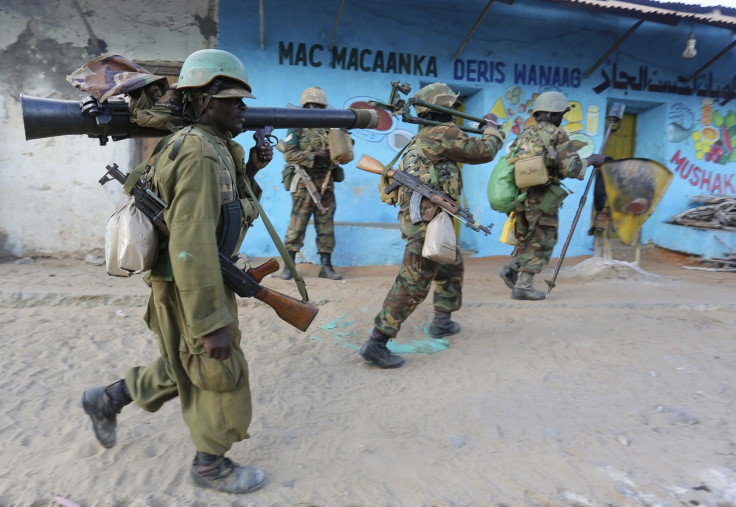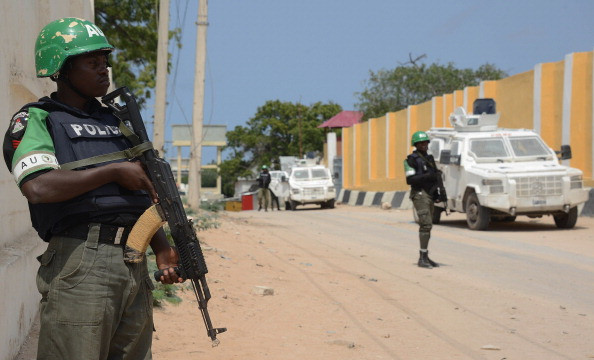Somalia: African Union peacekeepers held over 'illegal trade' in military equipment

Somalia's security forces have arrested 15 African Union (AU) peacekeepers after allegedly apprehending the soldiers selling military supplies to civilians in the capital Mogadishu.
The African Union Mission in Somalia (AMISOM) was created by the African Union in January 2007 as a regional peacekeeping mission with the approval of the United Nations.
While the mission is entirely funded by the European Union (EU) through contributions (€575m, £452m, $640m) made to the AU, the organisation recently announced it would reduce its funding to AMISOM by 20% following the rise of jihadist threats and conflicts in the region.
In May, Kenya also threatened to pull out its forces from Somalia if the international community failed to plug funding gaps for the operation.
AU soldiers 'selling resources meant for AU troops' to civilians
Somalia's police chief Mohamed Sheikh Hassan Hamud said its forces had arrested five AU peacekeepers and 10 Somali nationals, after catching them "red-handed"selling military equipment to civilians, including petrol, sandbags and detonators, according to the Somali National News Agency (SNNA).
The AMISOM troops were allegedly arrested after they were seen selling fuel and other military equipment in a garage in the Banadir neighbourhood of the Somali capital.
The soldiers had been under surveillance for a while, Hamud told local media, and police had been investigating "repeated claims" that equipment and other resources meant for AU troops were "ending up in the hands of people who were misusing them".

Interior Ministry confirms soldiers involved in 'illegal trade'
Somalia's Interior Minister, Abdirizak Omar Mohamed, said the AU forces were involved in illegal trade. "It may also explain why insecurity is increasing in Somalia. We have arrested those who were involved and we will bring them to book," he said.
While BBC reported the nationalities of the peacekeepers had not been disclosed, local media quoted SNNA saying the troops were from Uganda and Burundi. It remains unclear whether the Somali nationals were soldiers or civilians. The suspects are due in court soon.
It is the first time AU forces in Somalia have been arrested since 2007. The peacekeeping mission said on Twitter:
We are in touch with the Somali Police Force to establish the veracity of these claims. More info. to follow with factual details. #Somalia
— AMISOM (@amisomsomalia) June 5, 2016
AMISOM denies Al Shabaab attack on Dhamaso base
Sunday's arrests come as the peacekeeping force denied media reports on Monday (6 June) that Islamic militants Al Shabaab had attacked its base in Dhamaso, Gedo region.
"It is false as the incident never occurred", AMISOM said on Twitter. "The allegation is a desperate attempt by Al Shabaab to seek credibility in the wake of humiliating defeats."
AMISOM strongly denies media reports that Al Shabaab attacked its base in Dhamaso, Gedo region. It is false as the incident never occurred.
— AMISOM (@amisomsomalia) June 6, 2016
The peacekeeping force added it was "determined to crush Al-Shabaab and help the people of Somalia enjoy peace and security".
The claims come after United-States drone strikes were said to have killed up to 150 Al-Shabaab fighters at the Raso Camp training facility, where the US claimed they were preparing to target US and African forces, according to the Pentagon. The death toll of 150 was disputed by Somali officers, who put the figure at 27, according to Al Jazeera.
In May, British forces joined AU troops in an effort to nullify the increasing al-Shabaab threat.
The Al Qaeda-linked group is fighting an AU military force supporting a Western-backed government. There are numerous reports of foreign jihadists going to Somalia to help al-Shabab, from neighbouring countries, as well as an estimated 7,000 and 9,000 fighters from the US and Europe.
What is AMISOM?
Headed by the Special Representative of the Chairperson of the African Union Commission for Somalia (SRCC) Ambassador Mahamat Saleh Annadif, the African Union Mission in Somalia (AMISOM) is an active regional peace support mission set up by the Peace and Security Council of the African Union with the full backing of the United Nations.
The bulk of its 22,126 troops come from six countries; Uganda, Burundi, Djibouti, Kenya, Ethiopia and Sierra Leone, with Burundi the largest contributor with 5,432 soldiers.
© Copyright IBTimes 2025. All rights reserved.




















